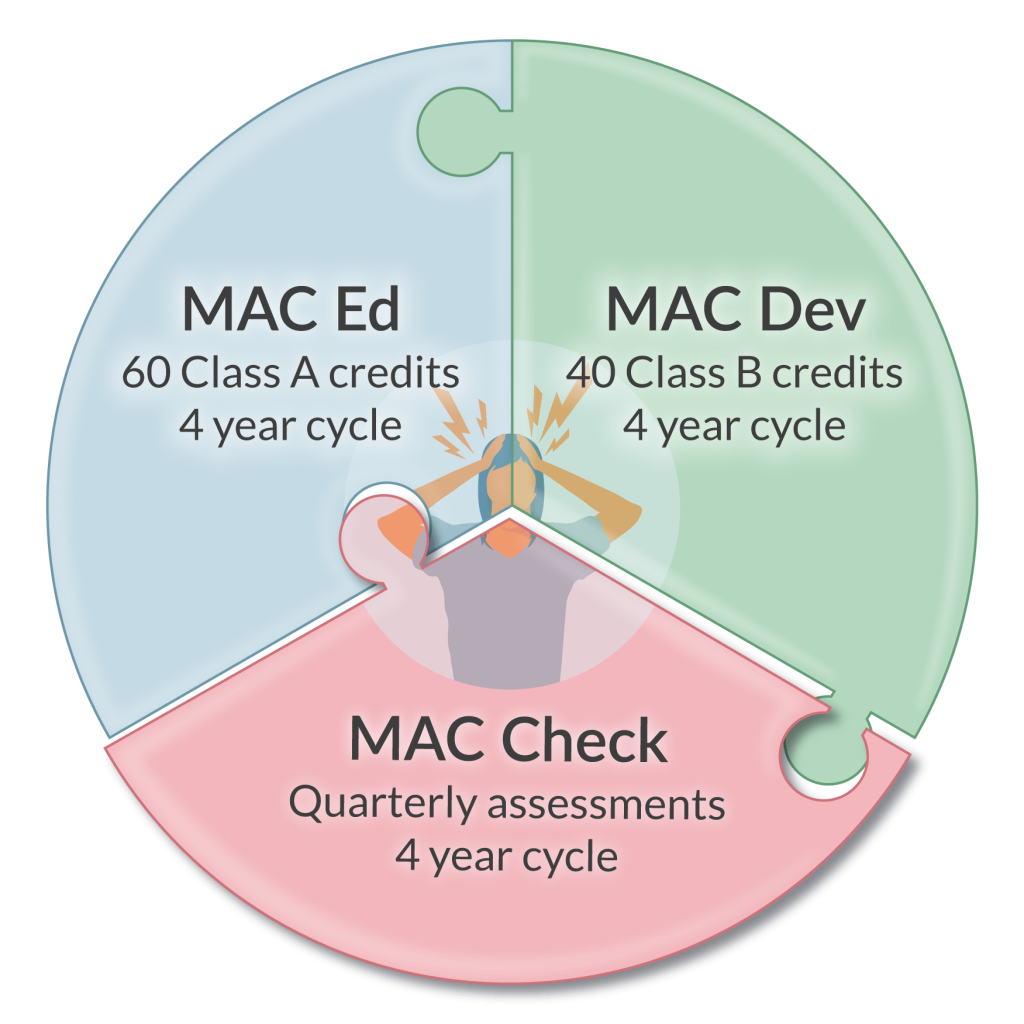Article Summary:
CRNA recertification is maintained through the NBCRNA’s Maintenance of Anesthesia Certification (MAC) Program, which focuses on continuous learning and ongoing assessment rather than a single high-stakes exam. CRNA’s complete recertification on a consistent 4-year cycle designed to support safe, current anesthesia practice.
To maintain CRNA certification, you must:
- Participate in the MAC Program as the sole recertification pathway
- Complete required continuing education credits (MAC Ed and MAC Dev)
- Complete the MAC Check, a quarterly longitudinal knowledge assessment
- Address learning needs identified through ongoing assessment
Understanding the requirements for Certified Registered Nurse Anesthetist (CRNA) recertification doesn’t have to be so challenging. Created by the National Board of Certification and Recertification for Nurse Anesthetists (NBCRNA), recertification ensures CRNAs remain at the appropriate skill level to administer safe and proper care.
If you want help understanding the steps to take toward CRNA recertification, you’re not alone. Let us walk you through the requirements!
Table of Contents
- The Maintaining Anesthesia Certification (MAC) Program
- MAC Program FAQs
- How to earn CRNA continuing education credits
The NBCRNA offers two distinct programs to maintain your CRNA certification: the Continued Professional Certification (CPC) Program, and the newly introduced Maintaining Anesthesia Certification (MAC) Program. As of August 1, 2025, the Maintenance of Anesthesia Certification (MAC) Program has officially replaced the former CPC Program as the sole pathway for CRNA recertification. Under the MAC Program, CRNAs complete ongoing knowledge checks and continuing education to maintain certification and stay current in anesthesia practice.
The Maintaining Anesthesia Certification (MAC) Program
NBCRNA recertification requirements have evolved. The new MAC Program has replaced the CPC Program, and all CRNAs will be enrolled in the program by 2026.
The MAC Program simplifies the recertification process; it’s a consistent 4-year cycle with the same requirements every cycle!

In the MAC Program, you’ll complete:
- MAC Ed (A new name for 60 Class A credits – see details in the Class A Credits section above)
- MAC Dev (A new name for 40 Class B credits – see details in the Class B Credits section above)
- MAC Check (Replaces the CPCA)
Although CPC Core Modules aren’t required for the MAC Program, they’re an efficient way to stay at the forefront of anesthesia practice while earning Class A credits.
What is the MAC Check?
Available on computers and mobile devices, the MAC Check is a longitudinal, quarterly assessment that tracks your progress and performance over a longer period of time.
The MAC Program is divided into 16 quarters. You’ll complete the MAC Check in 13 of the first 15 quarters, and you’ll get to pick 2 quarters where you can skip the MAC Check. Also, you won’t have to complete the MAC Check in your 16th quarter.
How does the MAC Check work?
In your 1st quarter, you’ll complete 25 multiple-choice and multi-select questions. Each question is timed for 1 minute, and you can bank unused time and apply it to subsequent questions. The platform will provide immediate feedback after each question, including the rationale for correct answers. You’ll also be able to view areas for improvement to guide your CE and development activities. In subsequent quarters, you’ll complete up to 30 questions.
If you answer a question incorrectly, you’ll encounter it again in a subsequent quarter. Re-administered questions make up to 5 incorrectly answered questions in each quarter, totaling between 25 to 30 questions.
Once you have completed 4 Mac Check quarters, you’ll receive preliminary feedback to see where you stand in regards to the performance standard. After the 13th knowledge check is completed, you’ll receive a final measurement for that cycle.
Explore the MAC sample to familiarize yourself with the new platform.
What happens if I “fail”?
If you don’t meet the performance standard, you must earn additional 5 MAC Ed (Class A) credits per domain where you don’t meet the passing standard. These credits are in addition to your 60 Class A credit requirement. Like the CPCA, MAC Check is not a pass/fail assessment, and you will not lose your certification so long as you complete the remediation requirements prescribed by the NBCRNA. However, completion of the MAC Check is required.
For more information on credit requirements based on MAC Check performance, please read What Every CRNA Needs to Know about the MAC Program.
MAC Program FAQs
How is the MAC Program different from the CPC Program?
Unlike the former CPC Program, the MAC Program focuses on continuous assessment and learning over time, rather than cyclical requirements alone. The goal is to support ongoing professional development and patient safety.
When did the MAC Program replace the CPC Program?
The MAC Program officially replaced the CPC Program on August 1, 2025.
What are knowledge checks under the MAC Program?
Knowledge checks are brief assessments completed throughout the MAC cycle to help CRNAs evaluate understanding of key anesthesia concepts and identify areas for continued learning.
Do CRNAs still need continuing education under the MAC Program?
Yes. Continuing education remains a core component of the MAC Program and is required to maintain certification and stay current in anesthesia practice.
How to earn CRNA continuing education credits
Meeting your CRNA continuing education requirements is simple with the right resources. The MAC Program reflects a shift toward continuous learning and assessment, helping CRNAs maintain certification while staying current in an evolving anesthesia landscape.
As CRNAs, we understand how challenging it can be to fit CRNA continuing education credits into your busy schedule. That’s why our online courses are available anytime, anywhere, and award Class A credits that support the education and professional development requirements of the MAC Program.
We’re here to help you on your CRNA recertification journey. Choose a bundle that works best for you today.






